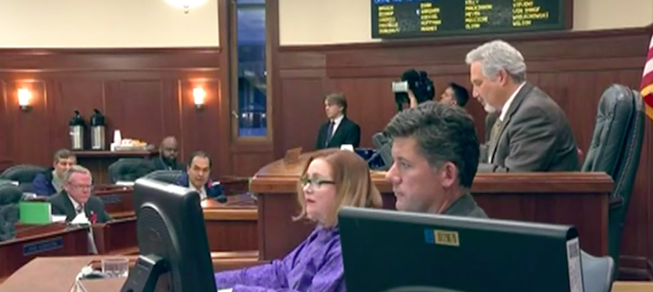By MATT FELLING
ANALYSIS AND COMMENTARY
I was there, man.
As a CBS News reporter in Anchorage covering Sen. Lisa Murkowski’s historic write-in election in 2010, I saw the variables at play and what strategies and tactics one must deploy to thread that needle.

As you may recall, Murkowski was defeated in the primary by the insurgent Tea Party-backed Joe Miller as that movement continued its ascent, and was forced to launch a write-in Republican bid that ran down the middle and pulled enough support from centrist, establishment voters to retain her seat. (Full disclosure: I served as Murkowski’s communications director from 2011-2015.)
But before the stories get written and the pundits ruminate about the how and who of a write-in campaign, here’s a spoiler alert from a former reporter who spent hours with each of the candidates along the campaign trail and had them or their teams on speed dial: Alabama ain’t Alaska. Luther Strange (the incumbent and most cited potential write-in) is no Lisa Murkowski, when it comes to time in the U.S. Senate and established value there. Democratic candidate Doug Jones is no Scott McAdams, the Alaska candidate from 2010.
That said, Roy Moore is in a league of his own compared to Joe Miller in terms of behavior drawing negative headlines, but he has decades of successfully sharing his message statewide and deep ties that aren’t going to evaporate.
First off, Roy Moore, who beat incumbent Luther Strange in the Republican primary run-off in September, has a much larger brand identity and reputation in the Yellowhammer State than Joe Miller, who narrowly nipped Murkowski by 2,000 votes (less than 2 percent of the primary vote), did in Alaska in 2010.
Moore’s previous electoral wins and statewide renown run far deeper than Miller’s fervent base then did. (For a hint of how ingrained Roy Moore is in Alabama’s culture and political scene, read my friend Joshua Green’s Atlantic profile of Moore in 2005.) Roy Moore’s negatives are abundantly clear right now to the nation, but his positives and track record in Alabama have created thousands of rock-ribbed supporters who are willing to stick with him.
Joe Miller was a flashpoint candidate with little statewide identity, but had a new, visceral message that resonated at that moment in time.
Secondly, Doug Jones is a true contender in this race with a list of accomplishments that even George Will begrudgingly acknowledges. Where Scott McAdams was a very small town mayor with a nascent network within the state, he had no built-in brand to tap into for the rest of Alaskans. But Doug Jones has been in the Alabama legal and political firmament for two decades – having been tapped as district attorney by Bill Clinton in 1997 – so his name recognition and resume are leaps and bounds ahead.
Oh, and he is either running neck-and-neck or has actually slid ahead of Roy Moore in recent days in state polling, 46-42.
Lastly, there’s the issue of the write-in candidate him or herself. When I talked with “Morning Joe” in the days after the surprising Alaska primary, Joe Scarborough cited poll numbers showing how Lisa Murkowski was far and away the most popular elected official in Alaska.
She had served Alaskans pragmatically and in a workmanlike fashion for years. But due to primary turnout motivation, a pall cast over the entire state in the weeks following the passing of Sen. Ted Stevens and several other factors, Murkowski’s support wasn’t borne out in the ballot booth. But it was there to be tapped into once the write-in decision was made.
So the math is truly difficult for a write-in candidate in any state; the Alaska 2010 race can be a case study but not a playbook. Though it required a tireless effort from her team, Murkowski ran against two vulnerable candidates – Miller with a pockmarked political history, McAdams with little of a track record to run on – and she was able to reach 40 percent on Nov. 2, 2010. Miller reached 35 percent and McAdams reached 24 percent.
That breakdown is the key distinction here in comparing Alabama 2017 and Alaska 2010. Let’s start by playing backwards from the core 100 percent number of voters. By the most conservative modeling, Doug Jones would likely range around 40-42 percent or so – likely a lot higher.
So the universe of support we are working with for the other candidates to scrap over is down to 60 percent … or less. Presuming that Roy Moore – even with his recent controversies, he has decades of relationships and a truly pugnacious style – would at worst be cut in half from his current level to 21 percent – which would leave 39 percent to a write-in candidate’s best scenario.
If Republicans are serious about launching a write-in campaign in Alabama, it’s a challenge along the lines of asking the Mercer Bears to beat the Crimson Tide this weekend. They will need to put their heads together and recruit a willing, singular talent with name recognition and accomplishments (and ideally an easy-to-spell name) to make an unprecedented push for the next four weeks – and even then hope for lightning in a bottle.
Matthew Felling is a senior director of public affairs and crisis communications at Burson-Marsteller. For over a decade, Felling’s insights and analysis were honed through reporting, commentary and media criticism inside Washington, D.C. – as well as working as a journalist covering the politics, priorities and personalities of Alaska. Between these professional phases, he worked as strategic communications director and senior adviser for Sen. Lisa Murkowski (R-AK), aligning her messaging with political dynamics. This analysis appeared first in U.S. News and World Report. He can be reached at [email protected].




